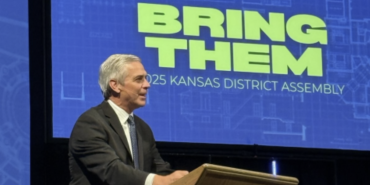Desperate Prayer

In the summer of 1876, grasshoppers decimated crops all across Minnesota. Desperate farmers worked day and night to keep their fields from ruin. As the crisis mounted, Governor John Pillsbury proclaimed April 26, 1877 as a statewide day of prayer and fasting. All the schools and businesses closed as people gathered in churches to pray and fast.
The next day the temperature soared abnormally. For three days horrified farmers watched billions of grasshopper larvae wiggle into life. On the fourth day, however, the temperature suddenly dropped, and the frost killed the larvae. People were astounded. Shortly thereafter, the remaining grasshoppers disappeared into the horizon.
The people were so thankful for this miracle that in Cold Spring, Minnesota, they constructed the "Grasshopper Chapel." A grateful generation embraced the memory of their desperate day of prayer and fasting and God's majestic deliverance.
What breakthrough is needed for your church to flourish? What Jesus miracle do you need in your life, marriage, or family? "For nothing is impossible with God" (Luke 1:37).
Desperate circumstances call for desperate prayer and fasting. R. A. Torrey said, "Every great crisis in life . . . should be met this way. There is nothing pleasing to God in our giving up . . . things which are pleasant, but there is power in . . . earnestness and determination to obtain in prayer the things we need, that leads us to put away everything . . . that we may set our faces to find God."
Fasting is the act of abstaining from food (one or more meals for one or more days) while focusing on a spiritual concern. The purpose of fasting is not to obtain what I want, but that I might be changed so God's will may be done.
Jesus launched His ministry with fasting. "Where for forty days he was tempted by the devil. He ate nothing during those days . . . " (Luke 4:2). Our Lord felt it was necessary to pray and fast, and we must do this as well. Jesus expected His followers to practice the habits of giving, praying, and fasting (Matthew 6:1-18). He did not say "if" but "when you fast." He taught us never to fast in order to impress others. "When you fast . . . [do it] so that it will not be obvious to men that you are fasting, but only to your Father, who . . . will reward you" (Matthew 6:16-18).
We pray and fast:
When facing desperate circumstances: "Alarmed, Jehoshaphat resolved to inquire of the LORD, and he proclaimed a fast for all Judah" (2 Chronicles 20:3). "Esther sent this reply to Mordecai: 'Go, gather together all the Jews. . . . Do not eat or drink for three days, night or day. I and my maids will fast as you do. When this is done, I will go to the king. . . . And if I perish, I perish'" (Esther 4:15-16).
In humility and confession: "The Israelites gathered together, fasting. . . . They stood where they were and read from the Book of the Law of the LORD their God for a quarter of the day, and spent another quarter in confession and in worshiping the LORD their God" (Nehemiah 9:1, 3).
To discover God's direction: "While they were worshiping the Lord and fasting, the Holy Spirit said, 'Set apart for me Barnabas and Saul for the work to which I have called them.' So after they had fasted and prayed, they placed their hands on them and sent them off" (Acts 13:2-3).
Fasting deepens our desire for God and His will.
In a materialistic world, fasting is a spiritual discipline that God uses to quiet our flesh so that we can focus on the Spirit. As we humble ourselves in obedient, faithful, and even desperate prayer and fasting, the Holy Spirit deepens our love and hunger for God, for the lost, and for the church. "Blessed are those who hunger and thirst for righteousness, for they will be filled" (Matthew 5:6).
Jerry D. Porter is a general superintendent in the Church of the Nazarene.
Holiness Today
Please note: All facts, figures, and titles were accurate to the best of our knowledge at the time of original publication but may have since changed.




